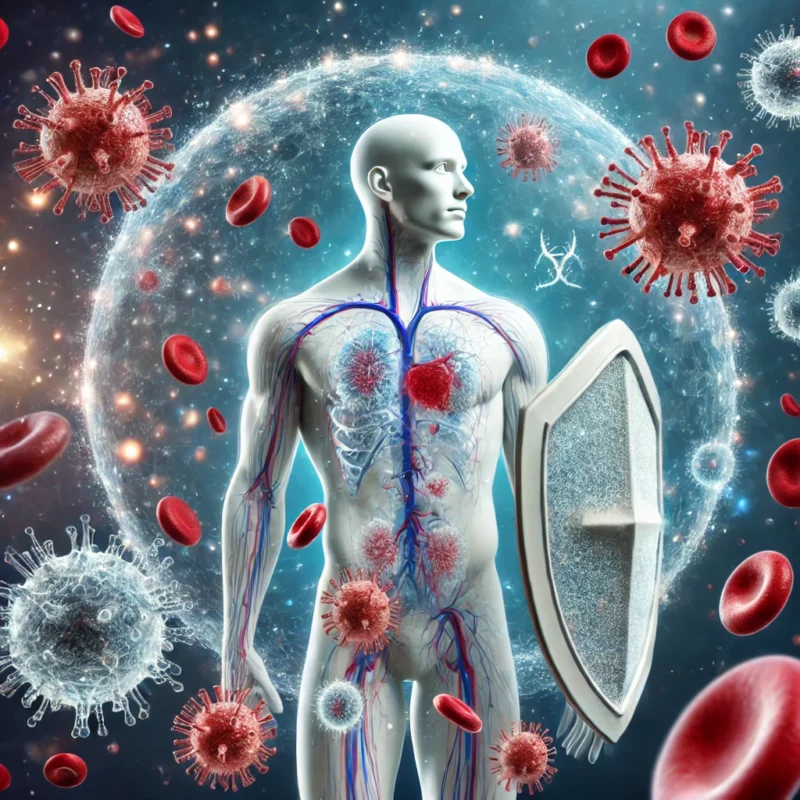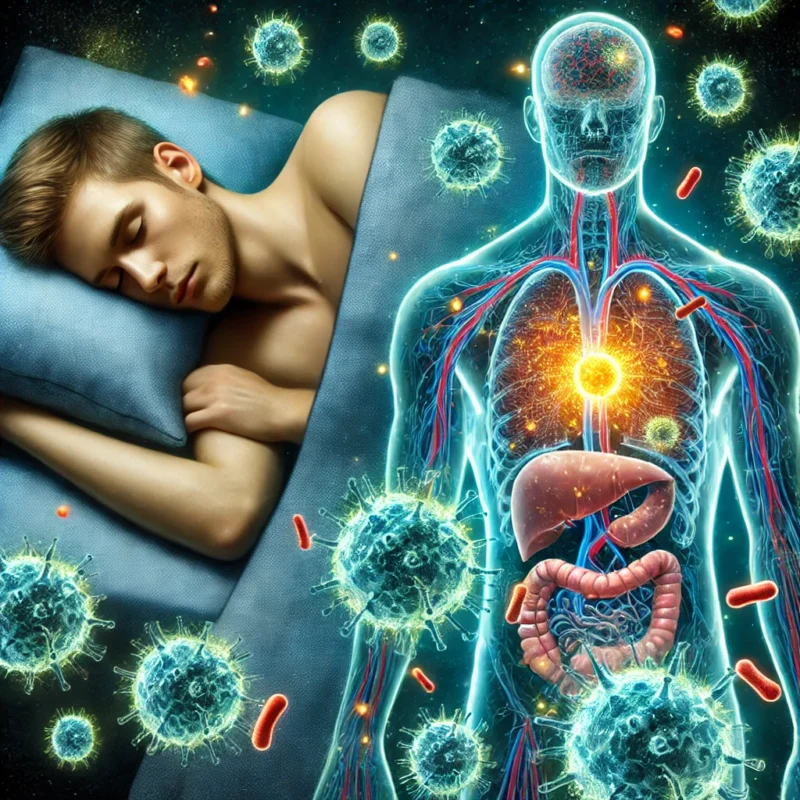In the race to balance work, family, and personal life, sleep often takes a backseat. In our modern world, sleep is undervalued, and people sometimes treat it as a luxury rather than a necessity. However, sleep is not merely a period of inactivity; it is an active, dynamic process where your body repairs, regenerates, and strengthens itself. One of the most critical systems that rely on sleep is the immune system, the body’s defense network against infections and illnesses.
Quality sleep is not only about waking up refreshed but is deeply connected to how well your body can fight off diseases, how quickly you recover from illnesses, and how well you respond to vaccines. Research increasingly shows that poor sleep habits can compromise the immune system, making you more susceptible to infections and chronic illnesses, whereas a good night’s sleep boosts immune function and helps maintain overall health.
In this in-depth blog post, we’ll explore the intricate relationship between sleep and immunity, backed by scientific research, and provide practical tips for enhancing sleep quality to optimize immune health. Understanding how sleep influences your immune system can help you prioritize sleep, ultimately improving your resistance to illness and your overall well-being.
Table of Contents
1. Understanding Sleep: More Than Just Rest

Before diving into the immune system connection, it’s essential to first understand what sleep truly is and why it plays such a pivotal role in health. While it may seem like an inactive state, sleep is actually a time when the body performs vital restorative functions. During sleep, the body undergoes many processes that contribute to health, including:
- Physical restoration: This is one of the most important functions of sleep. When you sleep, your body works to repair cells, tissues, and muscles. Sleep is particularly crucial for athletes and individuals recovering from physical injuries because the body releases growth hormones during deep sleep that aid in the recovery and building of muscles.
- Energy conservation: Sleep allows the body to reduce its energy expenditure and conserve resources. This is important for the brain and body, especially after a long day of physical and mental activity.
- Cognitive function: Sleep is also essential for brain health. It helps consolidate memories, improves learning, and enhances problem-solving skills. The brain uses sleep to process new information, commit it to memory, and remove waste products accumulated throughout the day.
- Emotional regulation: Sleep plays a significant role in maintaining emotional stability. People who don’t get enough sleep are more likely to experience mood swings, irritability, and emotional instability. Chronic sleep deprivation can even contribute to mental health disorders like depression and anxiety.
Sleep occurs in cycles, typically lasting around 90 minutes, and it includes different stages, such as non-rapid eye movement (NREM) sleep and rapid eye movement (REM) sleep. Each stage of sleep serves unique functions in supporting various systems of the body, including the immune system.
2. The Immune System: The Body’s Defense Network

The immune system is a complex and intricate network of cells, tissues, and organs that protect the body from harmful invaders like bacteria, viruses, fungi, and parasites. It acts like a sophisticated security system, identifying and neutralizing threats before they can cause harm.
The immune system is divided into two main parts:
- Innate Immune System: This is the body’s first line of defense and includes physical barriers (like the skin and mucous membranes) and immune cells that respond quickly to threats. Innate immunity is non-specific, meaning it reacts to all potential pathogens in the same way.
- Adaptive Immune System: This second line of defense is more specialized and is responsible for producing targeted responses to specific pathogens. Adaptive immunity involves the creation of antibodies that help the body recognize and eliminate foreign invaders. The adaptive immune system “remembers” pathogens it has encountered before, allowing for a quicker and more effective response in the future. This is the principle behind vaccinations.
These two systems work in tandem to protect the body from infections and to maintain a state of homeostasis, or balance, within the body. However, both systems rely on rest and recovery to function at their highest capacity. Without adequate sleep, the immune system cannot perform its job effectively.
3. The Link Between Sleep and the Immune System: The Science Behind It

Sleep and the immune system are closely intertwined. While you sleep, your body performs several key functions that directly affect immune health. There are specific biological mechanisms that help explain why sleep is essential for the immune system:
a. Increased Cytokine Production
Cytokines are small proteins released by immune cells that play a critical role in regulating immune responses. Some cytokines help promote inflammation, which is necessary for fighting off infections. Others help regulate the body’s immune system, ensuring it doesn’t overreact to potential threats.
When you sleep, particularly during deep sleep stages, your body ramps up the production of cytokines. These proteins act as messengers between cells, helping to coordinate the body’s response to infections. Cytokines not only help initiate an immune response but also aid in the recovery process after infections or injuries.
Research has shown that sleep deprivation can reduce the production of cytokines, making it harder for the body to respond effectively to infections. For example, when you get a cold, your body produces cytokines to help fight off the virus. If you haven’t been getting enough sleep, your body may not be able to produce enough cytokines to mount a strong immune response, leading to longer recovery times.
b. T-Cell Activation and Function
T-cells are a type of white blood cell that plays a crucial role in the body’s immune defense. They help the immune system recognize and destroy infected cells, particularly in the case of viral infections. T-cells are activated when the body detects a foreign invader, such as a virus or bacteria. Once activated, T-cells travel throughout the body to seek out and destroy infected cells.
Research has demonstrated that sleep enhances T-cell activity. During sleep, particularly deep sleep, the body optimizes T-cell functioning, making it easier for these immune cells to attach to and destroy infected cells. On the other hand, sleep deprivation reduces the efficiency of T-cells, weakening the body’s defense mechanisms. When T-cells cannot properly function, infections can persist longer, and the immune system is less able to contain and neutralize threats.
c. Natural Killer (NK) Cells
Natural Killer (NK) cells are another crucial component of the immune system. NK cells are a type of lymphocyte that target and destroy infected or cancerous cells. They play a key role in the body’s ability to combat viruses and prevent the spread of tumors.
Studies have shown that sleep deprivation can significantly reduce the activity of NK cells. In one study, participants who were deprived of sleep for one night experienced a 70% reduction in the activity of NK cells. This dramatic decrease in NK cell function illustrates how essential sleep is for maintaining the body’s natural defenses against cancer and infections.
d. Antibody Production and Immune Memory
Antibodies are proteins produced by the immune system in response to infections. They recognize and neutralize harmful invaders, such as viruses and bacteria. When your body encounters a pathogen, it produces antibodies specific to that invader. These antibodies help the immune system recognize and fight off the pathogen more effectively in the future. This process, known as immune memory, is what enables vaccines to protect you from diseases.
Sleep plays a vital role in antibody production. Several studies have found that individuals who do not get enough sleep produce fewer antibodies in response to vaccines, meaning their immune system is less equipped to fight off infections. For example, in a study on the flu vaccine, participants who slept fewer than six hours per night had significantly lower antibody responses compared to those who slept more than seven hours.
In another study, researchers looked at how sleep affects the body’s response to the hepatitis B vaccine. Participants who were sleep-deprived after receiving the vaccine produced fewer antibodies, making them less protected against the virus.
4. Consequences of Sleep Deprivation on Immune Function

While sleep is vital for immune health, the effects of sleep deprivation can be detrimental. Consistently failing to get enough sleep has wide-reaching consequences for the immune system, making the body more vulnerable to illness, delaying recovery, and increasing the risk of chronic diseases.
a. Reduced Cytokine Production
As mentioned earlier, cytokines are essential for coordinating the body’s immune response. When you don’t get enough sleep, your body produces fewer cytokines, making it harder to fight off infections. This reduced cytokine production can lead to slower recovery times, more severe symptoms, and an increased risk of developing chronic inflammation.
Chronic inflammation is linked to several health problems, including heart disease, diabetes, and cancer. Inadequate sleep can worsen inflammation, increasing your risk of developing these chronic conditions.
b. Weakened T-Cell Function
Sleep deprivation weakens T-cell activity, which compromises the body’s ability to fight off infections. This can make you more susceptible to viral infections, such as the flu and the common cold. Moreover, sleep-deprived individuals may experience more severe symptoms and longer recovery times when they do fall ill.
c. Increased Risk of Acute Infections
Numerous studies have shown that individuals who don’t get enough sleep are more likely to catch colds, the flu, and other respiratory infections. For example, a study conducted by Carnegie Mellon University exposed participants to the rhinovirus (the virus that causes the common cold). The study found that participants who slept fewer than six hours per night were four times more likely to catch a cold than those who slept seven or more hours.
In addition to respiratory infections, sleep-deprived individuals are more vulnerable to gastrointestinal infections, urinary tract infections, and other common illnesses. This is because sleep deprivation weakens the body’s immune defenses, making it easier for pathogens to take hold.
d. Increased Risk of Chronic Diseases
Chronic sleep deprivation is associated with an increased risk of several long-term health problems, including heart disease, diabetes, obesity, and even certain cancers. These conditions often involve immune system dysfunction and chronic inflammation. Sleep is critical for regulating these processes, and a lack of sleep can lead to an overactive immune system, increasing inflammation and contributing to the development of these diseases.
e. Impaired Vaccination Response
Sleep deprivation can also impact the body’s response to vaccinations. As discussed earlier, individuals who don’t get enough sleep produce fewer antibodies in response to vaccines, making them less protected against diseases. This has been observed with vaccines for the flu, hepatitis, and other viruses.
Given the importance of vaccines in preventing illness, ensuring that you get enough sleep before and after receiving a vaccine can significantly improve its effectiveness.
5. Scientific Research Supporting the Sleep-Immune Connection

Over the past several decades, numerous studies have been conducted to explore the relationship between sleep and the immune system. Here are a few key studies that highlight the importance of sleep for immune health:
a. Flu Vaccine and Sleep
One of the most well-known studies on sleep and the immune system looked at the body’s response to the flu vaccine. Researchers from the University of California, San Francisco, conducted a study in which participants received the flu vaccine and were then divided into two groups: one that slept for at least seven hours per night and one that slept for fewer than six hours.
The study found that participants who slept fewer than six hours had significantly weaker antibody responses to the vaccine, meaning they were less protected against the flu. This study highlights the critical role that sleep plays in enhancing the body’s response to vaccinations.
b. Common Cold and Sleep Deprivation
Another landmark study conducted by Carnegie Mellon University looked at the relationship between sleep and susceptibility to the common cold. The researchers exposed participants to the rhinovirus (the virus responsible for the common cold) and monitored their symptoms. Participants who slept fewer than six hours per night were found to be significantly more likely to develop cold symptoms compared to those who slept seven or more hours.
This study underscores the importance of sleep in preventing acute respiratory infections and demonstrates how sleep deprivation can increase the likelihood of getting sick.
c. Chronic Disease and Sleep Deprivation
A long-term study published in The Lancet examined the link between chronic sleep deprivation and the development of chronic diseases, such as cardiovascular disease, diabetes, and cancer. The researchers found that individuals who consistently slept fewer than six hours per night had a higher risk of developing these conditions compared to those who slept seven to eight hours.
Chronic inflammation and immune dysfunction were identified as key factors in the development of these diseases, both of which are worsened by sleep deprivation.
6. How to Improve Sleep for a Stronger Immune System

Improving sleep quality is one of the most effective ways to strengthen your immune system and reduce your risk of illness. Here are some practical strategies for getting better sleep:
a. Set a Consistent Sleep Schedule
Going to bed and waking up at the same time every day helps regulate your body’s internal clock, or circadian rhythm. This consistency makes it easier to fall asleep and wake up naturally, leading to higher-quality sleep.
Even on weekends, try to stick to your sleep schedule as much as possible. This will help your body maintain a healthy rhythm and improve overall sleep quality.
b. Create a Relaxing Bedtime Routine
Establishing a relaxing bedtime routine can signal to your body that it’s time to wind down and prepare for sleep. Some effective bedtime rituals include reading, listening to calming music, or practicing mindfulness meditation.
Avoid engaging in stimulating activities, such as working, watching TV, or using your phone, in the hour leading up to bedtime. These activities can make it harder for your brain to relax and transition into sleep.
c. Optimize Your Sleep Environment
Your bedroom environment plays a critical role in how well you sleep. To create an optimal sleep environment, aim to:
- Keep your bedroom cool: A slightly cool room (around 65°F or 18°C) is ideal for promoting restful sleep.
- Minimize noise: If you live in a noisy environment, consider using earplugs or a white noise machine to block out distractions.
- Limit light: Darkness signals to your brain that it’s time to sleep. Use blackout curtains to block out light, or wear a sleep mask if necessary.
- Invest in a comfortable mattress and pillows: Your bed should be supportive and comfortable to ensure a good night’s sleep.
d. Limit Exposure to Blue Light
The blue light emitted by electronic devices, such as smartphones, tablets, and computers, can interfere with the production of melatonin, the hormone that regulates sleep. To protect your sleep, avoid using electronic devices for at least an hour before bed.
If you must use your phone or computer in the evening, consider using a blue light filter or wearing blue light-blocking glasses to reduce the impact on your sleep.
e. Manage Stress
Stress is one of the most common culprits of poor sleep. If stress is keeping you awake at night, consider incorporating relaxation techniques into your bedtime routine. Deep breathing exercises, progressive muscle relaxation, and meditation are all effective ways to calm the mind and prepare the body for sleep.
If you find yourself lying awake worrying about things you need to do, try writing down a to-do list before bed. This can help offload your thoughts and clear your mind, making it easier to fall asleep.
f. Exercise Regularly
Regular physical activity has been shown to improve sleep quality and reduce the time it takes to fall asleep. However, be mindful of when you exercise. Intense workouts too close to bedtime can make it harder to fall asleep, so aim to finish your workout at least a few hours before bed.
Exercise can also help reduce stress, further improving your ability to get a restful night’s sleep.
7. The Broader Benefits of Quality Sleep

In addition to boosting your immune system, quality sleep provides a wide range of other health benefits. These include:
a. Improved Cognitive Function
Sleep plays a critical role in cognitive processes such as memory consolidation, problem-solving, and decision-making. People who get enough sleep are better able to focus, learn new information, and think creatively.
On the other hand, sleep-deprived individuals often experience difficulty concentrating, memory problems, and impaired judgment. Over time, chronic sleep deprivation can even contribute to cognitive decline and an increased risk of developing dementia.
b. Enhanced Emotional Well-Being
Sleep is essential for maintaining emotional stability. When you get enough sleep, you’re better able to regulate your emotions, cope with stress, and manage anxiety. Sleep deprivation, on the other hand, is linked to mood disorders such as depression and anxiety.
A well-rested brain is better equipped to handle daily challenges, which can improve your relationships, productivity, and overall quality of life.
c. Reduced Risk of Chronic Diseases
As discussed earlier, sleep plays a key role in regulating inflammation and immune function. By improving your sleep, you can reduce your risk of developing chronic diseases such as heart disease, diabetes, and cancer.
In addition, sleep helps regulate hormones that control hunger and appetite. People who don’t get enough sleep are more likely to overeat and gain weight, which can increase the risk of obesity and related health problems.
d. Better Physical Performance
Athletes and active individuals benefit from better sleep because it aids in muscle recovery and boosts stamina. Sleep helps repair muscles that have been broken down during exercise, allowing them to grow stronger.
Getting enough sleep can also improve coordination, reaction time, and endurance, making it essential for peak physical performance.
Conclusion
In conclusion, quality sleep is a powerful tool for maintaining a strong immune system and overall health. During sleep, the body performs critical processes that bolster immune function, including cytokine production, T-cell activation, and antibody production. On the flip side, sleep deprivation weakens the immune system, leaving the body more vulnerable to infections and chronic diseases.
By prioritizing sleep and making lifestyle changes to improve sleep quality, you can give your immune system the support it needs to keep you healthy. A good night’s sleep is not only about feeling rested the next day—it’s about building a resilient body that can fend off illness and stay strong in the face of challenges. So, if you want to strengthen your immune system and improve your overall health, start by focusing on better sleep. Your body will thank you for it.
